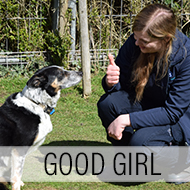
Peggy was brought to the RSPCA after losing her hearing.
A collie that was handed over to the RSPCA when she lost her hearing and could no longer work has learned sign language in order to continue working as a sheepdog.
Eight-year-old Peggy was brought into the RSPCA's Mid-Norfolk and North Suffolk branch in December 2018 as her previous owners could no longer keep her. Animal welfare manager Chloe Shorten agreed to foster the collie at first, but soon found that Peggy fit in perfectly with her family and her husband's work as a shepherd.
Unfortunately, as Peggy had lost her hearing she was unable to communicate with her handler. Ms Shorten said she new that the dog wanted to be working and so she and her husband started the process of teaching her sign language, with the help of a sheepdog trainer.
"We started by teaching her to look at us for hand signals,” said Ms Shorten. “We used repetitive and positive reinforcement and instead of pairing a verbal command with an action, we'd use a physical hand gesture.
"She reads our hand signals and body language as a way of telling what we're asking for. For example, thumbs up means 'good girl'."
While Peggy is mostly retired, she still goes out into the field to work sometimes and is always eager to learn new skills. She took some time to settle into her new home, but learning sign language has helped her to recognise when she is being praised and comforted and she is improving every day.
Ms Shorten concluded: "It's amazing to see her with this new lease of life and enjoying her life with us. She's proof that you can teach an old dog new tricks; and is a wonderful example of the capability of a dog, even if they do lose a sense."
Image (c) RSPCA.



 The Veterinary Medicines Directorate (VMD) is inviting applications from veterinary students to attend a one-week extramural studies (EMS) placement in July 2026.
The Veterinary Medicines Directorate (VMD) is inviting applications from veterinary students to attend a one-week extramural studies (EMS) placement in July 2026.